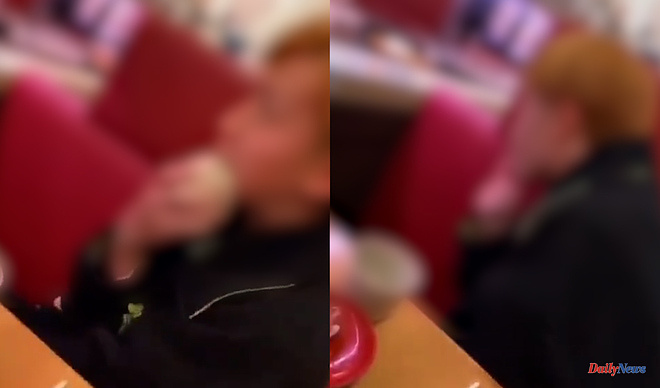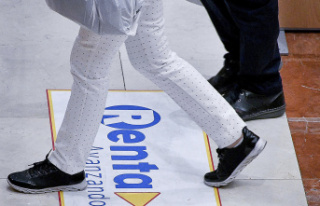The video is 48 seconds long and was shot at a Japanese chain famous for its rotating conveyor belt sushi buffet. A beardless young man licks two of his fingers and then begins to handle two pieces of the small Japanese delicacy that later ends up in the mouth of another diner, unaware of the filth committed by a boy who has not finished with the childish game.
A soy bottle without a cap passes through the belt, which the boy picks up and begins to suck on the filter through which the sauce comes out. He does the same with the edges of a cup of tea that was addressed to another customer.
The video circulated in February on Twitter. It went viral in Japan, with more than 40 million views. Users quickly identified the famous sushi chain where the culinary crime had been committed: Sushiro, in the restaurant it has in the city of Gifu, in the center of the country.
Such was the impact, with customers writing reviews saying they would never set foot in those restaurants again, that shares in the chain's parent company, Food
Adolescents bathing pieces of sushi with the bitter wasabi in different places. Or licking pieces that they later returned to deposit on the rotating trays of the very touristy kaitenzushi (which literally means "revolving sushi"), the name given to this type of establishment where sushi passes over and over again in front of the skilled and hungry hunter. with chopsticks, who usually pays at the end of the meal an amount depending on the number of dishes they have devoured. In other stores, the customer scans a QR code to choose the dishes he wants, which are also deposited on the conveyor.
At first it was not clear if it was a punctual hygienic incident or a dirty trend that was beginning to gain strength and that threatened to devastate the traditional wheel of gustatory pleasure of the third world economy. But after the Japanese media and some large Anglo-Saxon newspapers echoed the videos, these "sushi terrorists", as they were baptized on the networks, became the center of a great commotion in Japan that continues today, more even when the shadow of Covid looms over these Asian lands again, with a new uptick in infections. Because in Japan, unlike most countries in the world, the authorities continue to report figures to the public daily with the new positives.
The media hype that was given to the misdeeds, instead of stopping what a priori seemed isolated pranks, triggered the number of videos (spitting on the rice, spraying sushi with hand sanitizer...) that were published on networks from accounts anonymous, or that circulated through the WhatsApp groups of adolescents.
The police have launched an investigation because the situation has reached the point that some sushi chains have announced that they are considering ending the famous sushi wheels. This threatens an industry, that of 'kaitenzushi', with an estimated value of 740,000 million yen, which in exchange is around 5,100 million euros.
"Could sushi terrorism forever change the way millions of diners in Japan eat their country's signature dish?" That is the question that the correspondent of 'The Guardian' in Tokyo asked himself on Wednesday.
A Japanese web newspaper, 'SoraNews 24', collected this week responses such as that of the Choshimaru sushi chain, which has announced that the conveyor belts of its 63 restaurants would stop and that its employees would have to serve food directly to the customer at the table.
The drastic decision of this chain has come after another video went viral in which a boy in one of his restaurants put out a cigarette in a container of pickled ginger.
The problem is getting so big that there are already restaurants that have announced that they are going to go after these sushi terrorists with artificial intelligence. The Kura Sushi chain said last week that it would soon introduce AI-equipped cameras to monitor tables in its restaurants.
"The system can detect unusual behavior from customers, such as removing a dish from the conveyor belt and returning it quickly," reads the statement they issued. "Our company has been hearing a large number of customers tell us that they no longer trust or want to go to conveyor belt sushi restaurants."
On Wednesday night, the Japanese police reported that they had arrested three people (Yoshino Ryoga, 21, and two teenagers whose names have not been revealed) who posted a video online where they licked a sauce dispenser. soybeans at one of the Kura Sushi restaurants in the city of Nagoya.
According to the criteria of The Trust Project












